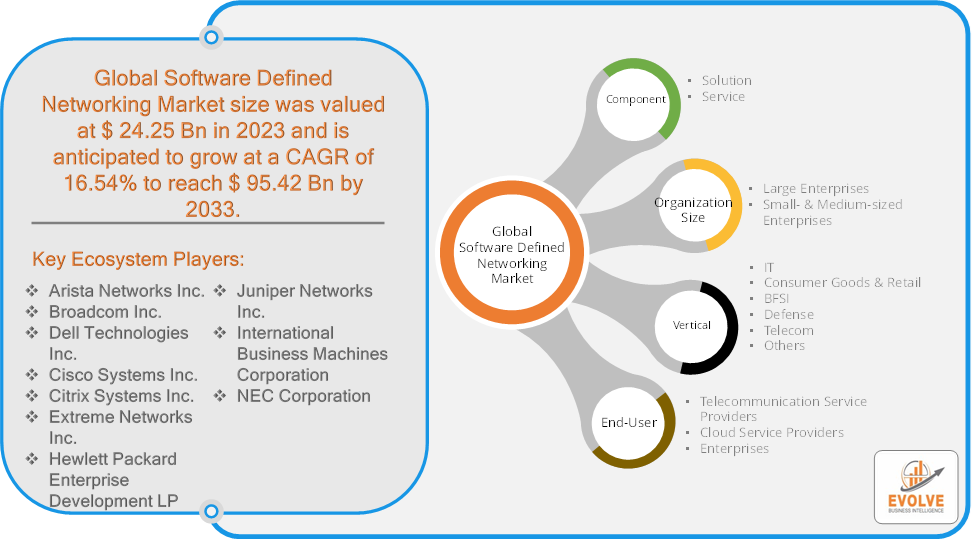Software Defined Networking Market Soars: 17% CAGR

Evolve Business Intelligence has published a research report on the Global Software Defined Networking Market, 2023–2033. The global Software Defined Networking Market is projected to exhibit a CAGR of around 17% during the forecast period of 2023 to 2033.
Evolve Business Intelligence has recognized the following companies as the key players in the global Software Defined Networking Market: Arista Networks Inc., Broadcom Inc., Dell Technologies Inc., Cisco Systems Inc., Citrix Systems Inc., Extreme Networks Inc., Hewlett Packard Enterprise Development LP, Juniper Networks Inc., International Business Machines Corporation and NEC Corporation.
 More Information: https://evolvebi.com/report/software-defined-networking-market-analysis/
More Information: https://evolvebi.com/report/software-defined-networking-market-analysis/
Market Highlights
The Global Software Defined Networking Market is projected to be valued at USD 95.42 Billion by 2033, recording a CAGR of around 17% during the forecast period. The Software-Defined Networking (SDN) Market involves the segment of the technology industry focused on SDN solutions and services. SDN is a network architecture approach that allows network administrators to manage network services through abstraction of lower-level functionality. This separation of the network control plane from the data plane allows for more flexible and efficient network management and operation.
The SDN Market is influenced by advancements in networking technology, the increasing complexity of network environments, and the growing demand for more agile and scalable networking solutions.
The COVID-19 pandemic had significant impacts on the Software-Defined Networking (SDN) market. The pandemic forced many organizations to rapidly adopt digital solutions to support remote work and online operations. This shift increased the demand for flexible, scalable network solutions like SDN to manage the growing complexity of remote and cloud-based environments. With more people working from home and using online services, network traffic surged. SDN solutions helped manage this increased traffic more efficiently by providing better network visibility, control, and optimization. The pandemic accelerated the migration to cloud-based services, as businesses needed to ensure continuity and scalability. SDN played a crucial role in optimizing cloud network performance and managing resources effectively. With the increase in remote work, cybersecurity became a heightened concern. SDN provided improved network security through centralized control and better traffic management, helping organizations address new security challenges.
Segmental Analysis
The global Software Defined Networking Market has been segmented based on Component, Organization Size, End User and End Use.
Based on Component, the Software Defined Networking Market is segmented into Solutions and Service. The Solutions segment is anticipated to dominate the market.
Based on Organization Size, the global Software Defined Networking Market has been divided into Large Enterprises and Small- & Medium-sized Enterprises. The Large Enterprises segment is anticipated to dominate the market.
Based on End Users, the global Software Defined Networking Market has been divided into Telecommunication Service Providers, Cloud Service Providers and Enterprises. The Enterprises segment is anticipated to dominate the market.
Based on End Use, the global Software Defined Networking Market has been divided into IT, Consumer Goods & Retail, BFSI, Defense, Telecom and Others. The IT and Telecomm segment is anticipated to dominate the market.
More Information: https://evolvebi.com/report/software-defined-networking-market-analysis/
Regional Analysis
The Software Defined Networking Market is divided into five regions: North America, Europe, Asia-Pacific, South America, and the Middle East, & Africa. North America region has been a pioneer in SDN adoption, with a strong presence of technology giants and a well-established IT infrastructure. The market is driven by the increasing demand for network virtualization and cloud computing services. The European SDN market is characterized by a diverse landscape, with varying levels of adoption across different countries. The region is witnessing a growing focus on SDN solutions to address the challenges of network complexity and security. The Asia Pacific region is experiencing rapid growth in the SDN market, driven by the increasing adoption of digital technologies and the need for network modernization. Countries like China, India, and Japan are emerging as key markets for SDN solutions. The Latin American SDN market is relatively nascent, with a growing interest in SDN solutions among enterprises and service providers. The region is expected to witness significant growth in the coming years, driven by the need for network optimization and cost reduction. The Middle East and Africa region is also witnessing a growing demand for SDN solutions, driven by the increasing adoption of cloud computing and IoT technologies. The region’s focus on digital transformation is expected to drive the growth of the SDN market.
